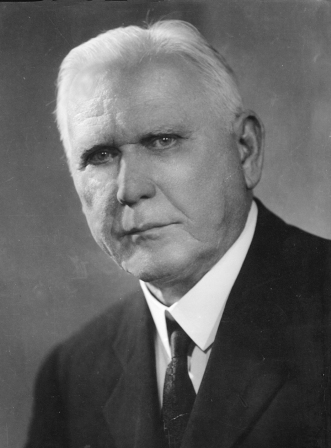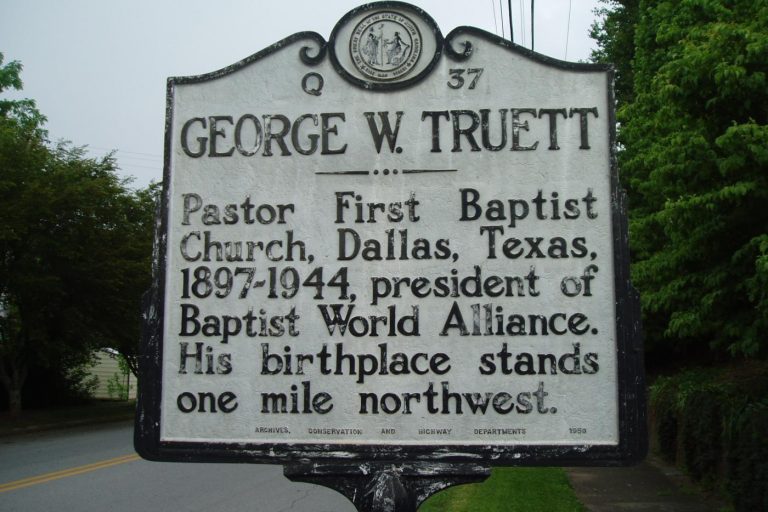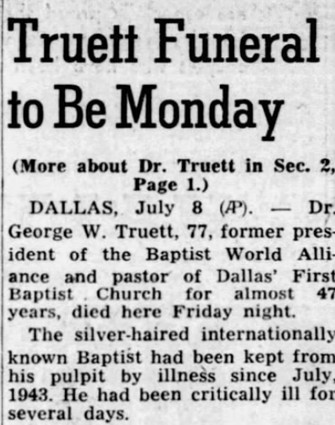George Washington Truett
“To know the will of God is the greatest knowledge! To do the will of God is the greatest achievement.”
(George Washington Truett)
George W. Truett: Pastor, Preacher, and Statesman of Faith
George Washington Truett (1867–1944) was one of the most influential Southern Baptist leaders in American history—a pastor, preacher, and denominational statesman whose life exemplified faithful ministry and steadfast dedication to God’s Word. Known for his powerful pulpit presence, unwavering commitment to the authority of Scripture, and leadership in both church and civic matters, Truett shaped the course of the Southern Baptist Convention and left a lasting legacy that continues to inspire ministers and laity alike.
Early Life and Conversion
George W. Truett was born on May 6, 1867, in Niverville, Texas, to modest farming parents. His upbringing was marked by simplicity, hard work, and the values of rural Texas life. Despite limited formal education, Truett exhibited a keen intellect and strong character from a young age.
Raised in a Christian home, Truett was exposed early to the teachings of the Baptist faith. He professed personal faith in Christ as a youth and was baptized in accordance with the believer’s baptism tradition of the Southern Baptist Church. This early spiritual foundation would serve as the anchor for a life devoted to the preaching and defense of the gospel.
The Call to Ministry
Truett’s sense of calling came during his teenage years. Despite his lack of formal schooling, he pursued opportunities to study and preach. He enrolled at Baylor University in Waco, Texas, which offered him the chance to deepen both his academic and theological understanding. While there, he studied under distinguished professors and became increasingly convinced that God had called him to a life of pastoral ministry.
Following his studies, Truett accepted small pastorates in Texas, where he honed his preaching skills and learned the practicalities of shepherding congregations. Even in these early years, his sermons reflected clarity, simplicity, and a keen understanding of human need. He was deeply committed to communicating the gospel in a way that was both doctrinally sound and personally convicting.
Pastor of First Baptist Church, Dallas
In 1897, Truett became pastor of First Baptist Church in Dallas, Texas—a post he would hold for forty-eight years until his death. Under his leadership, the church grew from a modest congregation to one of the largest and most influential Southern Baptist churches in the nation.
Truett’s preaching was marked by a combination of warmth, authority, and practical application. He focused on the centrality of Christ, the authority of Scripture, and the necessity of personal holiness. His sermons were not mere intellectual exercises; they were calls to genuine faith and transformed living. He also emphasized evangelism, missions, and social responsibility, urging his congregation to be a light in both church and community.
Evangelistic Zeal and Denominational Leadership
Truett’s reputation extended far beyond Dallas. His preaching drew national attention, and he became a sought-after speaker for revivals, conferences, and denominational gatherings. He was deeply committed to the cause of missions, believing that the church’s primary responsibility was to proclaim the gospel at home and abroad.
In addition to his pastoral work, Truett played a pivotal role in the Southern Baptist Convention (SBC). He served as president of the SBC from 1927 to 1929, during which he emphasized unity, scriptural fidelity, and cooperative efforts in missions and education. He sought to balance denominational growth with doctrinal integrity, believing that the church must remain anchored in the Word while reaching the lost.
One of Truett’s most notable public moments came in 1920, when he delivered the invocation at the inauguration of President Warren G. Harding. His prayer, delivered with dignity and simplicity, was widely praised and reflected his deep concern for the moral and spiritual well-being of the nation. Throughout his life, Truett emphasized the importance of the church speaking to society without compromising its biblical principles.
Commitment to the Authority of Scripture
George W. Truett was uncompromising in his belief in the authority and sufficiency of Scripture. He championed the doctrines of inerrancy and inspiration, teaching that the Bible was the ultimate guide for faith and practice. His sermons and writings consistently pointed believers back to the Word of God as the foundation of spiritual life.
Truett also addressed cultural and social issues from a biblical perspective. While he avoided political partisanship, he consistently urged Christians to live in accordance with Scripture, uphold justice, and work for the moral good of society. His approach demonstrated that faithful ministry must speak to both the heart and the conscience of the nation.
Writing and Influence
Although Truett was primarily a preacher, he also authored numerous books, articles, and devotional works. His writings covered a range of topics, from practical Christian living to doctrinal instruction. Among his most widely read works are The Soul of the Minister and The Preacher and His Work, which remain valuable resources for pastors and students of ministry.
Through his preaching, writing, and leadership, Truett influenced generations of Southern Baptists. Many pastors who studied under him or were inspired by his ministry went on to serve with distinction, perpetuating his emphasis on biblical fidelity, pastoral care, and evangelistic zeal.
Personal Life and Character
Truett married Lillian Key, with whom he had several children. Those who knew him personally described him as humble, approachable, and deeply devoted to God. Despite his prominence, he remained a man of prayer, spending hours in personal devotion and intercession. His life demonstrated that true leadership in the church is grounded in personal holiness, compassion, and a relentless focus on Christ.
He was also noted for his ability to connect with people from all walks of life. Whether speaking to the wealthy, the working class, or the marginalized, Truett communicated the gospel with clarity and sincerity, earning the trust and affection of countless individuals.
Later Years and Legacy
Truett continued to pastor First Baptist Church, Dallas, into the 1940s, even as health challenges arose. He passed away on February 21, 1944, leaving behind a transformed congregation, a strengthened denomination, and a legacy of faithful ministry.
George W. Truett’s influence extended far beyond his own congregation. He helped shape the Southern Baptist Convention into a denomination committed to missions, education, and biblical fidelity. His writings and sermons continue to be studied by pastors and laypeople who seek to understand how to combine doctrinal clarity with practical ministry.
Conclusion
George W. Truett’s life exemplifies the power of faithful pastoral ministry. From humble beginnings in rural Texas to the pulpit of one of the nation’s most influential churches, he remained committed to the authority of Scripture, the call to evangelism, and the care of souls.
His legacy endures in the thousands of lives he touched through preaching, teaching, and personal example. Truett’s ministry reminds the church that true greatness is measured not by prominence or wealth, but by faithfulness to God’s Word, devotion to Christ, and a life spent in service to others. For generations of pastors and believers, George W. Truett remains a model of pastoral excellence, evangelical courage, and unwavering commitment to the gospel.
_____
Image Source/Credit (in order):
- Contemporary photograph, Public domain, via Wikimedia Commons
- “George W. Truett (Q-37).” NC DNCR, 23 Jan. 2024, www.dncr.nc.gov/blog/2024/01/23/george-w-truett-q-37.
- Newspapers.com, Fort Worth Star-Telegram, July 9, 1944, https://www.newspapers.com/article/fort-worth-star-telegram/190999866/
Related
Sorry, no records were found. Please adjust your search criteria and try again.
Sorry, unable to load the Maps API.


